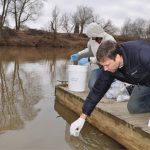Front Porch Blog
Updates from Appalachia

Clean energy works, I heard it on the radio
 The more that Virginia news outlets cover the ins and outs of energy, the more Virginians will understand where our electricity comes from and whether these sources are safe, reliable and affordable for all. So tune in to this recent five-part series highlighting the opportunities and obstacles for clean energy in the commonwealth.
The more that Virginia news outlets cover the ins and outs of energy, the more Virginians will understand where our electricity comes from and whether these sources are safe, reliable and affordable for all. So tune in to this recent five-part series highlighting the opportunities and obstacles for clean energy in the commonwealth.
Supreme Court Rejects Spruce Mine Mountaintop Removal Case

The U.S. Supreme Court says it won’t consider the case of Mingo Logan Coal Co. v. EPA, a lawsuit challenging the U.S. Environmental Protection Agency’s authority to veto mountaintop removal permits. In this case, the permits in question are for Arch Coal’s Spruce Mine No. 1 — the largest mountaintop removal project ever proposed in West Virginia.
Pro-Mountaintop Removal Bill Headed to House Floor
 It’s hard to get a good bill all the way through the legislative process to receive a vote on the House floor. Apparently it’s much easier to get a bad bill that far. H.R. 2824 — pro-mountaintop removal legislation that would weaken protections for Appalachian streams — is expected to head to the House floor for a full vote sometime next week.
It’s hard to get a good bill all the way through the legislative process to receive a vote on the House floor. Apparently it’s much easier to get a bad bill that far. H.R. 2824 — pro-mountaintop removal legislation that would weaken protections for Appalachian streams — is expected to head to the House floor for a full vote sometime next week.
Fouling Our Nest: Coal Ash Roundup and Next Steps
 We’ve watched national interest in North Carolina’s coal ash mess grow over the past month and a half, and it’s been a wild ride. The Dan River spill on Feb. 2 sparked a wave of support for closing the 33 ash ponds owned by Duke Energy polluting North Carolina’s surface and ground waters. Here are the most recent developments.
We’ve watched national interest in North Carolina’s coal ash mess grow over the past month and a half, and it’s been a wild ride. The Dan River spill on Feb. 2 sparked a wave of support for closing the 33 ash ponds owned by Duke Energy polluting North Carolina’s surface and ground waters. Here are the most recent developments.
Electricity Costs Tied to Poverty in the South
 Fifty years ago, President Johnson declared a “war on poverty” in America, and Congress passed legislation to increase support and economic opportunities for the poor. Appalachia was the “poster region” for this grand endeavor. Today, a “war on wasted energy” makes sense for many reasons, and it would provide a much-needed boost to communities in Appalachia and across the South who are most in need.
Fifty years ago, President Johnson declared a “war on poverty” in America, and Congress passed legislation to increase support and economic opportunities for the poor. Appalachia was the “poster region” for this grand endeavor. Today, a “war on wasted energy” makes sense for many reasons, and it would provide a much-needed boost to communities in Appalachia and across the South who are most in need.

